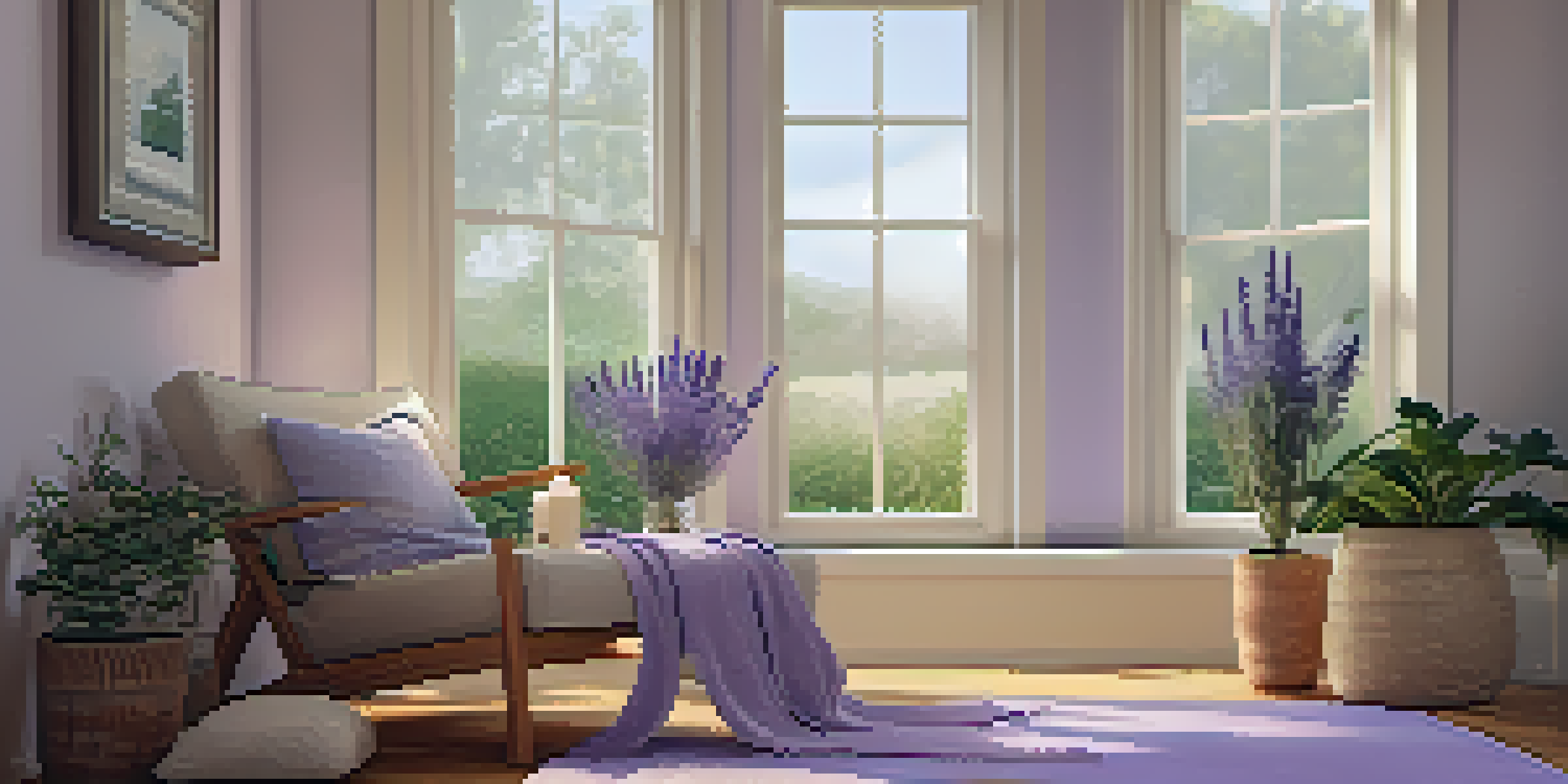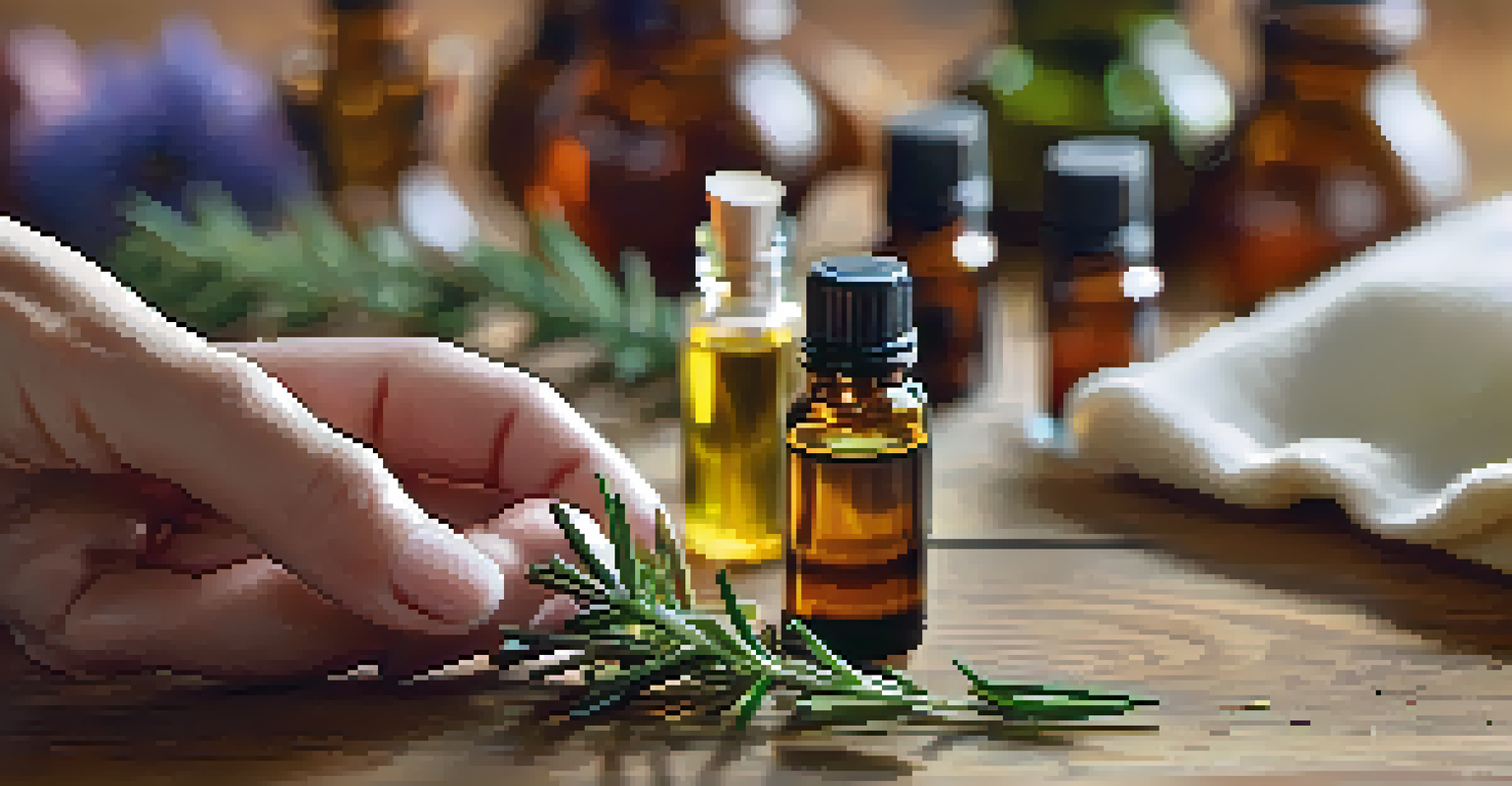The Role of Aromatherapy in Promoting Healthy Aging

What is Aromatherapy and Its Benefits for Aging
Aromatherapy is a holistic healing practice that uses essential oils to improve physical and emotional well-being. These oils, extracted from plants, carry unique properties that can promote relaxation, reduce stress, and enhance mood. As we age, our bodies and minds undergo changes, making it essential to find effective ways to support our health.
The greatest wealth is health.
One of the main benefits of aromatherapy for older adults is its ability to alleviate anxiety and depression. With the pressures of aging, feelings of loneliness and despair can creep in, but soothing scents like lavender and bergamot can uplift spirits and create a sense of calm. This emotional support is crucial in maintaining overall health as we age.
Moreover, aromatherapy can aid in improving sleep quality, which is often disrupted in older adults. Oils like chamomile and sandalwood are known for their relaxing properties, helping to promote a restful night’s sleep. Better sleep leads to improved cognitive function, making it easier to navigate daily challenges.
Essential Oils to Consider for Healthy Aging
When it comes to promoting healthy aging through aromatherapy, not all essential oils are created equal. Some of the most beneficial oils include lavender for relaxation, rosemary for mental clarity, and frankincense for its anti-inflammatory properties. Each of these oils can play a role in enhancing both mental and physical health.

For instance, peppermint essential oil can help with digestion, which is particularly important as we age and our metabolism slows down. Similarly, geranium oil is known to balance hormones and improve skin elasticity, making it a fantastic choice for those looking to maintain a youthful appearance. By choosing the right oils, individuals can tailor their aromatherapy practices to their specific needs.
Aromatherapy Supports Emotional Health
Essential oils like lavender and bergamot can alleviate anxiety and depression, promoting emotional well-being in older adults.
It's also essential to consider the method of application. Diffusing oils into the air, adding them to baths, or using them in massage can all provide different benefits. Experimenting with various methods can lead to a more personalized and effective aromatherapy experience.
Creating a Relaxing Environment with Aromatherapy
Aromatherapy is not just about the oils themselves; it’s also about creating a soothing environment. Consider setting up a dedicated space in your home where you can unwind and enjoy your favorite scents. Whether it's a cozy corner with a diffuser or a warm bath filled with essential oils, the atmosphere can significantly enhance the experience.
Aging is not lost youth but a new stage of opportunity and strength.
Incorporating elements like soft lighting, comfortable seating, and calming music can further enhance relaxation. This sensory combination creates a peaceful sanctuary, making it easier to escape the stresses of daily life. Such an environment is especially beneficial for older adults who may face challenges such as mobility issues or social isolation.
Moreover, inviting family or friends to join in the aromatherapy experience can also foster connection and joy. Sharing this practice with loved ones can strengthen bonds and create lasting memories, contributing to overall emotional well-being as we age.
The Science Behind Aromatherapy and Aging
While aromatherapy is often regarded as a holistic practice, scientific research supports its benefits. Studies have shown that certain essential oils can trigger positive responses in the brain, helping to reduce stress and improve mood. This is particularly relevant for older adults who may be dealing with chronic stressors.
For example, research indicates that inhaling essential oils like lavender can lower cortisol levels, the hormone associated with stress. Lower cortisol levels can lead to improved overall health, as chronic stress is linked to various age-related ailments. Such findings highlight the importance of integrating aromatherapy into daily routines.
Essential Oils Enhance Sleep Quality
Using calming oils such as chamomile and sandalwood can improve sleep quality, leading to better cognitive function as we age.
Additionally, the anti-inflammatory properties of some essential oils can support physical health as we age. Inflammation is often a contributing factor to many chronic diseases, and using oils like eucalyptus can help manage these symptoms. This science-backed approach makes aromatherapy a valuable tool in promoting healthy aging.
Incorporating Aromatherapy into Daily Routines
Integrating aromatherapy into daily life doesn’t have to be complicated. Simple actions like adding a few drops of essential oil to your bath or using a diffuser while reading can make a significant difference in your day-to-day well-being. It’s all about finding what works best for you and making it a regular practice.
Another easy way to enjoy aromatherapy is by creating personalized roll-on blends. Mixing essential oils with a carrier oil allows for easy application on pulse points, providing a quick mood boost whenever needed. This portable option is perfect for those on the go or those who may find it challenging to set aside dedicated relaxation time.
Moreover, incorporating aromatherapy into mealtime can be an enjoyable experience. Infusing your cooking with herbs like basil or rosemary can not only enhance flavor but also add nutritional benefits. This holistic approach to wellness emphasizes the importance of integrating aromatherapy into various aspects of life.
Safety Considerations for Using Essential Oils
While aromatherapy offers numerous benefits, it’s important to approach it with care. Essential oils are highly concentrated substances, and improper use can lead to adverse reactions. Always conduct a patch test before applying oils directly to the skin, and consult with a healthcare professional if you have any underlying health conditions.
Additionally, older adults may have specific sensitivities or allergies that should be taken into account. For instance, citrus oils may increase photosensitivity, leading to skin irritation if exposed to sunlight. Being aware of these factors ensures a safe and enjoyable aromatherapy experience.
Safety is Key in Aromatherapy Use
It's vital to use high-quality essential oils and conduct patch tests to avoid adverse reactions, ensuring a safe aromatherapy experience.
Lastly, it’s crucial to select high-quality essential oils from reputable sources. Synthetic oils may lack therapeutic properties and can even cause harm. By prioritizing safety and quality, individuals can fully enjoy the benefits of aromatherapy while minimizing risks.
The Future of Aromatherapy in Healthy Aging
As we continue to explore the benefits of aromatherapy in promoting healthy aging, the future looks promising. With ongoing research into the therapeutic properties of essential oils, we are likely to discover even more ways to support physical and emotional well-being in older adults. This evolving field holds great potential for enhancing quality of life.
Moreover, the growing interest in holistic health practices suggests that more people will turn to aromatherapy as a natural remedy. This shift in mindset encourages individuals to take an active role in their health, fostering a sense of empowerment as they age. Embracing natural solutions can lead to more balanced and fulfilling lives.

Ultimately, the role of aromatherapy in healthy aging is about more than just scents; it’s about enhancing the overall experience of growing older. By integrating these practices into daily life, older adults can cultivate a lifestyle that prioritizes wellness, connection, and joy.